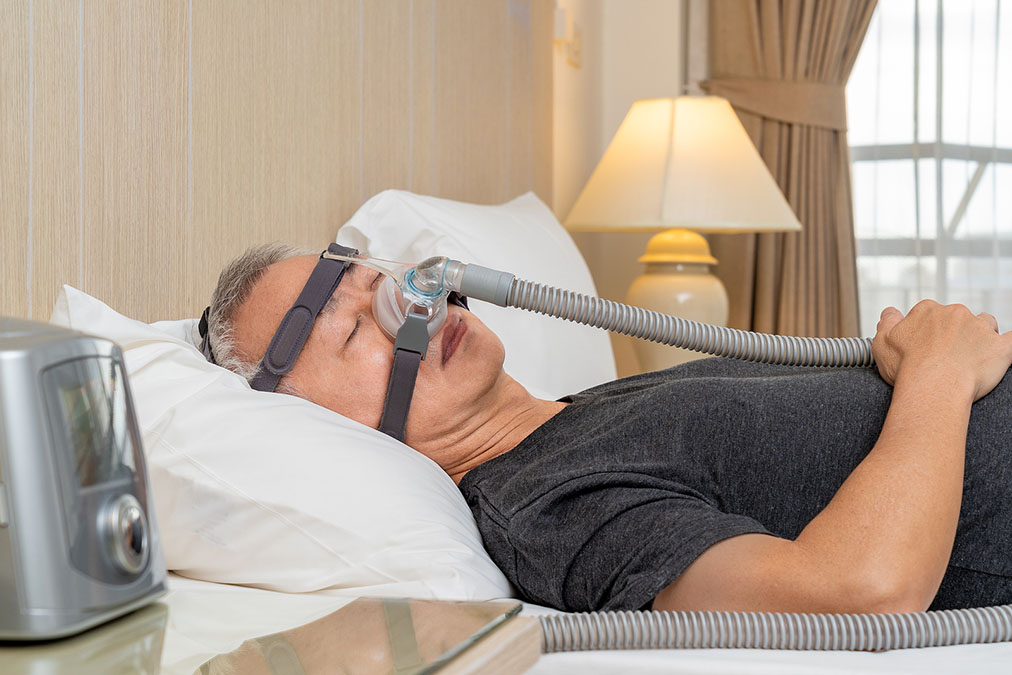 There are many severe health consequences of sleep apnea, including obesity, stroke, heart attack, and dementia. So, there are many benefits to treating it.
There are many severe health consequences of sleep apnea, including obesity, stroke, heart attack, and dementia. So, there are many benefits to treating it.
A new study published in JAMA Network Open reveals one more benefit of treating sleep apnea… it makes you smarter!
The research, involving 5,946 adults across five independent community-based cohorts in the US, was led by Australia’s Monash University. They took their study’s subjects from the Atherosclerosis Risk in Communities study, Cardiovascular Health Study, Framingham Heart Study, Osteoporotic Fractures in Men Study, and Study of Osteoporotic Fractures.
The subjects were between 58 and 89 years old, had no stroke or dementia history, and were not experiencing any sleep problems, as far as they were aware.
They were subjected to an overnight sleep study to examine how well they slept and whether they suffered from sleep apnea. They were also put through a variety of cognitive assessments to obtain a global cognitive score for each.
Even though the subjects were not aware of sleep problems, almost half of them suffered from sleep apnea, while between 16.9 and 28.9% struggled with its moderate or severe forms.
These were the key findings.
-
1. Cognition was better in subjects who woke up the least during the night and slept the longest relative to their time in bed.
2. Mild, moderate, and severe sleep apnea were all associated with poorer cognition, with lower cognitive scores almost twice as common in subjects with this breathing disorder
3. The amounts of time the subjects spent in the different sleep stages, including deep and REM sleep, did not affect their cognitive abilities.
There are several reasons why this study is interesting.
It is shocking that half of all people who think they don’t have sleep difficulties actually have sleep apnea. If you don’t think you have a problem, you obviously won’t address it and will suffer a deterioration in your cognitive abilities.
The second interesting aspect is that it is not the amount of time that you sleep that contributes to cognition but rather your sleep consolidation or efficiency. In other words, sleeping without waking for a few hours is the best type of sleep for brainpower.
As sleep-related issues are on the rise, this study can help us to understand what type of sleep facilitates cognitive health. These results may have far-reaching implications, especially in the aging population that is at greatest risk of cognitive decline.
How do you treat your sleep apnea to make yourself smarter?

 Multiple Sclerosis
Multiple Sclerosis Banishing Bronchitis
Banishing Bronchitis Gum Disease Gone
Gum Disease Gone Overcoming Onychomycosis
Overcoming Onychomycosis Neuropathy No More
Neuropathy No More The Prostate Protocol
The Prostate Protocol Brain Booster
Brain Booster
 Ironbound
Ironbound
 Solution for Shingles
Solution for Shingles
 The Bone Density Solution
The Bone Density Solution
 The Ultimate Healing Protocol
The Ultimate Healing Protocol
 The Parkinson's Protocol
The Parkinson's Protocol
 The Chronic Kidney Disease Solution
The Chronic Kidney Disease Solution
 Overthrowing Anxiety
Overthrowing Anxiety The Fatty Liver Solution
The Fatty Liver Solution The Hypothyroidism Solution
The Hypothyroidism Solution
 The End of Gout
The End of Gout The Blood Pressure Program
The Blood Pressure Program
 The Oxigized Cholesterol Strategy
The Oxigized Cholesterol Strategy
 Stop Snoring And Sleep Apnea Program
Stop Snoring And Sleep Apnea Program
 The Arthritis Strategy
The Arthritis Strategy The Vertigo & Dizziness Program
The Vertigo & Dizziness Program The 3-Step Diabetes Strategy
The 3-Step Diabetes Strategy Hemorrhoids Healing Protocol
Hemorrhoids Healing Protocol The Erectile Dysfunction Master
The Erectile Dysfunction Master Weight Loss Breeze
Weight Loss Breeze The IBS Program
The IBS Program The Insomnia Program
The Insomnia Program The Migraine and Headache Program
The Migraine and Headache Program The Neck Pain Solution
The Neck Pain Solution The Menopause Solution
The Menopause Solution The Ejaculation Master
The Ejaculation Master The TMJ Solution
The TMJ Solution The Acid Reflux Solution
The Acid Reflux Solution The Fibromyalgia Solution
The Fibromyalgia Solution The Psoriasis Strategy
The Psoriasis Strategy